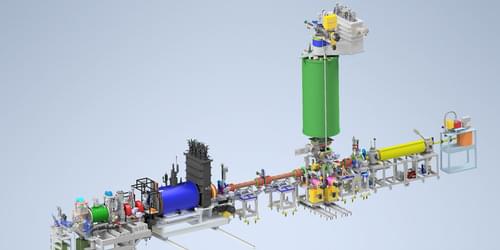Researchers have turned an optical lattice into a ratchet that moves atoms from one site to the next.




The 2024 Breakthrough Prize in Fundamental Physics goes to John Cardy and Alexander Zamolodchikov for their work in applying field theory to diverse problems.
Many physicists hear the words “quantum field theory,” and their thoughts turn to electrons, quarks, and Higgs bosons. In fact, the mathematics of quantum fields has been used extensively in other domains outside of particle physics for the past 40 years. The 2024 Breakthrough Prize in Fundamental Physics has been awarded to two theorists who were instrumental in repurposing quantum field theory for condensed-matter, statistical physics, and gravitational studies.
“I really want to stress that quantum field theory is not the preserve of particle physics,” says John Cardy, a professor emeritus from the University of Oxford. He shares the Breakthrough Prize with Alexander Zamolodchikov from Stony Brook University, New York.

This article was written by Grant Aylward, product manager – warehouse robotics, and Lauren Miller, director of autonomy & behavior for Stretch.
We reached a big milestone with Stretch at the end of August—since shipping to customers in January 2023, Stretch robots have moved more than 1 million customer boxes. We designed Stretch to automate the strenuous work of unloading trailers and containers for greater safety and efficiency, and the demand has been tremendous. Stretch takes on the labor of repetitive lifting and lowering of heavy loads, and keeps the flow of goods moving so warehouses can meet demand. Stretch robots are tackling that work every day with customers like DHL and Maersk.
Stretch remains a very early-stage product. Our first prototype Stretch robot powered on in 2019, and we kicked off our first long-term installation at a customer site just this year. So, how did we get to 1 million boxes with such a young robot? As we developed Stretch over the past few years, we worked closely with potential customers to understand warehouse environments and operations and to refine our product to meet their need. As we shifted from Boston Dynamics’ long legacy of R&D work to commercializing robots, we also put certain structures and practices in place to get the robot out of the lab and into the real world. This involved three major efforts: increasing performance, robustness, and reliability of our robot; focusing on safety; and building amazing partner relationships.

Amazon is buying itself and its customers’ priority access to Anthropic’s foundational models.
As Amazon announced in a press release, the online retailer and cloud provider plans to invest up to four billion US dollars in the AI startup Anthropic. Amazon has thus secured an important partner in the field of generative AI. Anthropic is best known for its chatbot Claude, which competes with OpenAI’s ChatGPT.
Anthropic moves to the AWS cloud.

Summary: Neuroscientists have achieved a groundbreaking feat by mapping the early visual system of a parasitic wasp, smaller than a grain of salt.
Utilizing advanced imaging technologies, they reconstructed the entire system at the synaptic level, a first for any animal. Despite its miniature size, the wasp’s brain exhibited immense complexity, with functions and neural circuits paralleling larger brains.
This research not only deepens understanding of neural principles but also holds potential for enhancing artificial intelligence.



India became only the fourth nation ever to land a spacecraft on the Moon earlier this summer. The Chandrayaan-3 mission is still technically underway, but its days may be numbered. After waiting several weeks for the lunar night to end, the Indian Space Research Organisation (ISRO) reports that the mission’s Vikram lander and Pragyan rover remain offline.
Chandrayaan-3 arrived in orbit of the Moon in July, right alongside Russia’s Luna-25 spacecraft. The uncrewed missions were both angling to be the first to touch down in the Moon’s southern polar region, an area where NASA hopes to send astronauts in the coming years. Russia was on course to land first, but a system error caused the vehicle to crash instead. That left India to land at its leisure, which it did on Aug. 23.
According to the Chandrayaan-3 team, they’ve attempted to contact the lander and rover now that the sun is shining again. However, no signals have been received from the surface. It’s possible Vikram (see above) and Pragyan are well and truly dead after several weeks in the frigid night. However, the ISRO hasn’t given up hope. Even if the batteries are empty, the hardware may still be working. Given some time to soak in the rays, the robots could still come back online.

The Giant Magellan Telescope begins the four-year process to fabricate and polish its seventh and final primary mirror, the last required to complete the telescope’s 368 square meter light collecting surface, the world’s largest and most challenging optics ever produced. Together, the mirrors will collect more light than any other telescope in existence, allowing humanity to unlock the secrets of the universe by providing detailed chemical analyses of celestial objects and their origin.
Last week, the University of Arizona Richard F. Caris Mirror Lab closed the lid on nearly 20 tons of the purest optical glass inside a one-of-a-kind oven housed beneath the stands of the Arizona Wildcats Football Stadium. The spinning oven will heat the glass to 1,165°C so as it melts, it is forced outward to form the mirror’s curved paraboloid surface. Measuring 8.4-meters in diameter—about two stories tall when standing on edge—the mirror will cool over the next three months before moving into the polishing stage.
At 50 million times more powerful than the human eye, “the telescope will make history through its future discoveries,” shares Buell Jannuzi, Principal Investigator for the fabrication of the Giant Magellan Telescope primary mirror segments, Director of Steward Observatory, and Head of the Department of Astronomy at the University of Arizona. “We are thrilled to be closing in on another milestone in the fabrication of the Giant Magellan Telescope.”